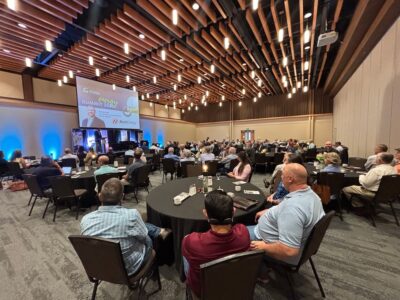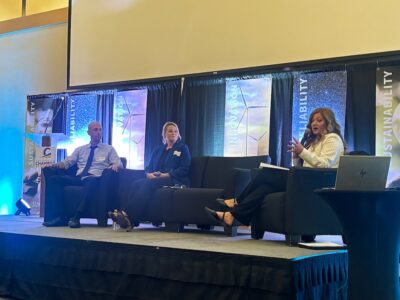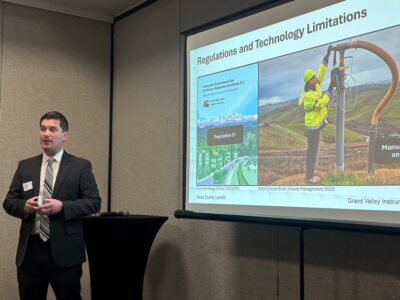Brandon Leuallen, The Business Times

Grand Junction hosted business and policy leaders Aug. 19 for the Grand Junction Chamber Energy Summit, a daylong event exploring how Colorado can balance growing electricity demand, economic development and regulatory pressures.
National perspective on energy reality
The summit opened with a keynote address from Marty Durbin, senior vice president of policy and president of the Global Energy Institute at the U.S. Chamber of Commerce. Durbin framed the discussion around what he called the nation’s “energy reality.”
“If we truly find one word and describe the overall dynamic of what we need as a national energy policy, that word is more,” Durbin said. “We need more electrons. We need more molecules. We need more transmission lines. We need more critical minerals. We need more factories. We need all.
“And we need every energy source out there, so oil and gas, nuclear, renewables, hydro. We’re going to need all of those energy sources to be able to meet the demand that is coming here.”
Durbin noted how quickly global energy dynamics can shift, pointing to the shale revolution, Russia’s war in Ukraine, and now the rise of artificial intelligence and data centers.
“Less than two years ago, the International Energy Agency put out its World Energy Outlook. It didn’t mention AI,” he said. “This was less than two years ago. Well, then within a few months everybody was talking about it.
“In 2024, you saw electricity demand growth that was 60 percent higher than historic averages. And that’s just continued to grow. So, we all know now that’s what we’re focused on. How are we going to power the data centers that are coming along in addition to just maintaining the grid?”

On permitting-process reform, Durbin pressed for faster decisions and fewer delays.
“I just don’t believe that it should take four-and-a-half years as it does right now, on average, to get a federal permit,” he said. “By the way, that’s not even getting the permit. That’s getting a yes or no answer. The answer may be no after four-and-a-half years.
“Highways take seven years. Transmission lines can be 10 years. We want to build stuff. We’ve got to be able to break through these logjams.”
Durbin emphasized that energy debates in Washington, D.C., must be grounded in business realities across the country.
“This is really both a national security and an economic security issue,” he told the audience. “We need to make sure policies are in place that encourage and incentivize the investments that will allow for the kind of growth that brings all of those other benefits competitiveness, higher wages and better standards of living.”
Workforce and energy choices
The morning discussion featured Laura Hickernell of Colorado Cleantech and Dr. Nathan Perry, a Colorado Mesa University economics professor.
Hickernell highlighted opportunities and challenges in emerging technologies, saying, “I’m really excited about geothermal, nuclear and even fusion. There are incredible opportunities, but startups are facing steep costs, and sometimes the policy environment is contradictory and ends up picking winners and losers.”
Perry laid out the scale of energy’s role in Colorado’s economy, saying, “Energy jobs make up 5.7 percent of employment statewide, and the same share here in Mesa County. In Garfield and Rio Blanco counties, the numbers are far higher. We’re looking at a 50 percent increase in electricity demand by 2040.”
His conclusion was straightforward.
“We need all energy,” Perry said. “That’s not politics. That’s economic reality.”
Reliability, regulation and demand

At lunch, Hickernell, Robert Kenney of Xcel Energy and Chelsie Miera of the Colorado Oil and Gas Association shared their perspectives on balancing energy supply, policy and investment.
Kenney emphasized the need for both clean energy and reliable baseload power.
“We’ve committed to cutting carbon emissions 80 percent by 2030 and being 100 percent clean by 2050,” he said. “But it’s not always sunny or windy, so natural gas remains essential.”
He also highlighted Xcel’s $22.3 billion capital plan through 2029 and cautioned that regulators often “prioritize one set of goals over another rather than balancing them.”
Miera described her industry’s regulatory challenges, pointing to a new rule requiring natural gas facilities to be electrified as unrealistic and costly. Her association filed suit against the state earlier this year, with Mesa County joining the case “to protect Western Slope energy jobs and economy.” She also warned that rules are driving jobs out of Colorado.
“We’ve now gotten to a point where we’re pushing the production out of Colorado, because it is so difficult here,” she said. “Instead of producing in Western Colorado, it’s being pushed to Utah, Wyoming, down into New Mexico and Texas. And it is very policy- and regulatory-driven.”
Miera noted the contrast with nearby states.
“New Mexico has an interesting dynamic,” she said. “Their school system is funded by oil and natural gas, and it’s an amazing opportunity they’ve used to better their schools and their state. That’s the kind of model we could be looking at here in Colorado.”
Hickernell highlighted the importance of choices in an era when electricity demand is projected to grow quickly.
“There is no perfect solution,” she said. “Costs, benefits and opportunities like nuclear and fusion all have to be considered.”
Miera closed with a call to action: “Energy is at the core of our livelihood. It’s long past time for Western Colorado to be involved and make sure policymakers know what’s happening out here.”
Breakout sessions
Afternoon breakout sessions covered a wide range of energy topics:
- Jim Sims of Policy Communications discussed re-shoring minerals to strengthen U.S. energy security.
- A panel on EV infrastructure highlighted efforts to meet rising charging demand.
- Mesa County Landfill and Grand Valley Instrumentation demonstrated new technology to boost methane capture.
- Another session focused on moving energy projects from planning to construction.
- Industry experts explained how incentives like the Inflation Reduction Act affect businesses.
- Mesa County Commissioner Cody Davis outlined Mesa County’s latest energy code updates and what they mean for builders and developers.
